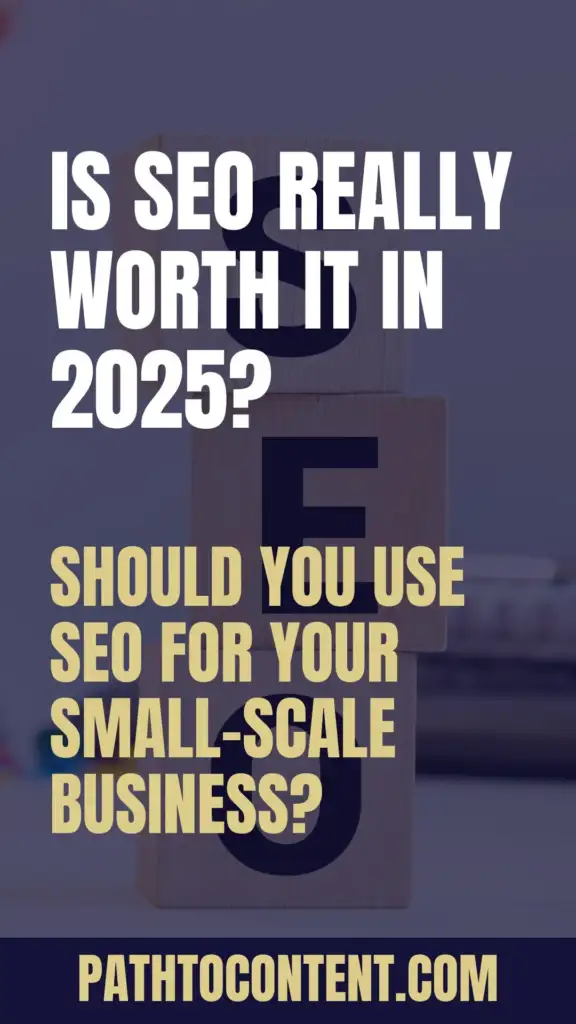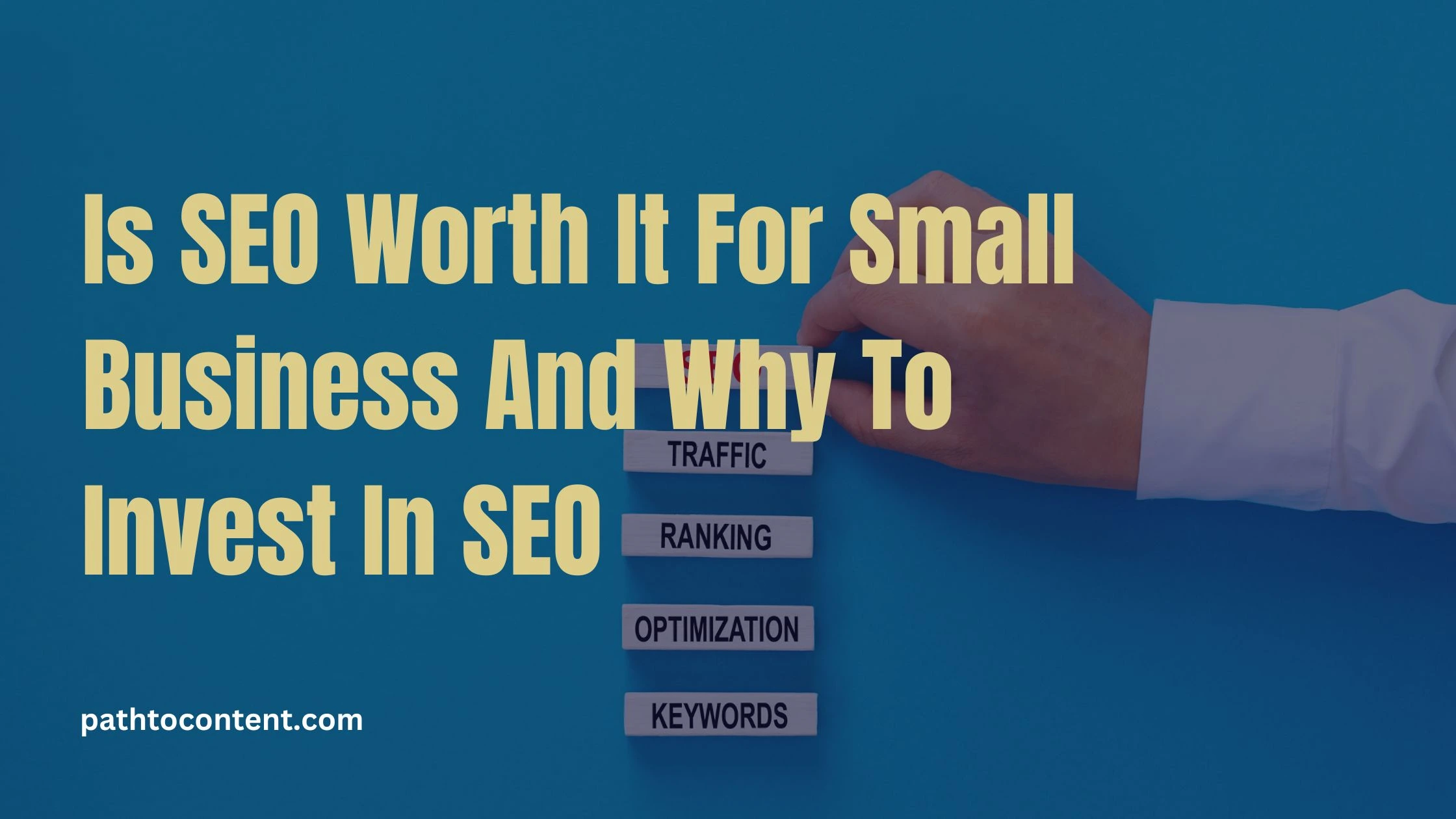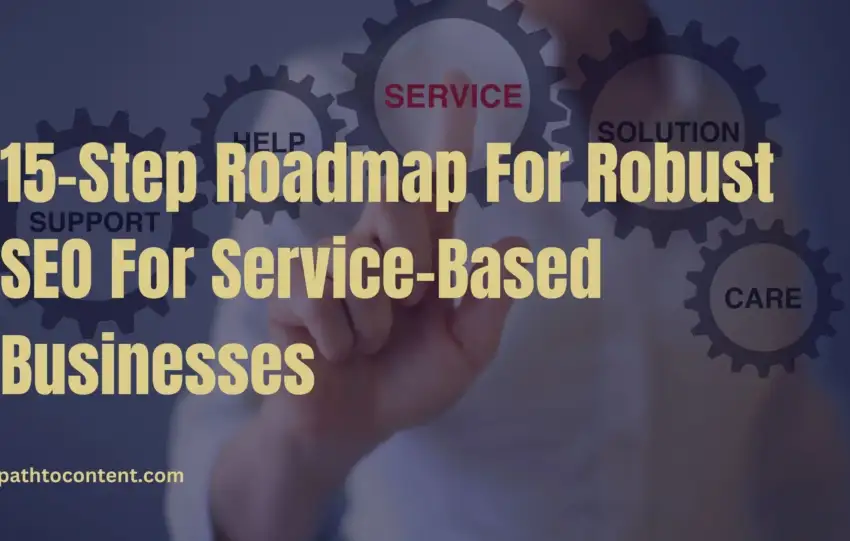I’m an SEO and content strategist, so my job is to promote SEO. But I’ll be a realist today and talk about the benefits of investing in SEO and the drawbacks you can expect if you’re a small business.
So, is SEO worth it for small businesses? The short answer: Yes and No.
Now, for the long answer 👇
Is SEO Worth It For Small Businesses? TL;DR

Yes, because SEO provides long-term benefits. It’s sustainable. You might not see the results of SEO the very next day, but once you see them, they’ll be there to stay. If you do everything right, SEO also helps you reap the benefits for months and years. It’s cost-effective, too, as you don’t pay each time your website appears on searches like paid advertising.
Here’s a case study by WebX that discusses how they helped a client improve their SEO and CRO results.
Now, talking about the negatives, honestly, there are too many fluctuations going on in the world of organic searches. Gen AI integration, zero-click searches, AI tools, and generic content—not to mention the many Google updates—there’s too much to consider if you’re just starting to work on SEO.
Chances are, SEO might not be the most logical investment. You can get better results from other organic marketing channels like social media marketing.
To find out if you really need SEO, it’s better to take 2-3 months of trial with an SEO before you commit and pay for the long term.
Now that I’ve answered the question in short let’s go into the depths of each topic and explore if SEO is worth it for your small business.
Why is SEO important? Benefits of SEO for business
SEO comes with many benefits, some of which include the following:
Long-Term Growth
Investing in SEO sets the foundation for sustainable blogging growth. Over time, efforts compound into significant results. Once you generate enough high-ranking pages, they continue attracting visitors without additional spending.
Ranking pages remain ranking if you keep updating them with recent information, stay updated with the latest happenings, and offer the best information.
Because of its long-lasting nature, your initial SEO investment keeps giving you returns, making it an excellent long-term strategy.
Cost-Effectiveness
Consider this: with PPC, you’re paying for every single click on your website. With SEO, once your pages rank well, you receive organic traffic without ongoing costs per visitor. This doesn’t mean SEO is free—it requires time and resources—but the cost per acquisition generally decreases over time.
Consumer Behavior
Audiences largely prefer organic search results over paid ads. Regardless of the medium, up to 70-80% of users ignore paid ads and focus on organic results. Now, we know the shelf life of SEO content is longer than that of other channels, making organic SEO efforts more sustainable.
Moreover, appearing in organic search results enhances your credibility. People are more likely to trust businesses that appear at the top of search engine results, as they often associate these higher rankings with credibility and industry expertise.
A source for in-depth BOFU content
SEO serves as an excellent source for in-depth Bottom-of-Funnel (BOFU) content, helping convert ready-to-buy customers. Unlike social media or paid ads, SEO allows you to create comprehensive content that addresses specific buyer concerns and commercial intent.
BOFU content through SEO typically includes:
- Product comparison pages
- Detailed case studies
- “How to outsource” guides (like the example “how to outsource content writing”)
- Pricing-related content
- Implementation guides
- Service/product-specific tutorials
The advantage of BOFU SEO content is its longevity and intent matching. When users search for specific solutions with commercial intent, well-optimized BOFU content appears at the right moment in their buying journey.
How Long Does SEO Take To Show Results?
It usually takes 6-12 months to see substantial SEO results. For some websites and industries, the result can come earlier, say within the first 3-4 months, and sometimes it can also take about 18 months. But the approximate ideal window is 6-12 months.
Now, many other factors contribute to the time it takes for you to see results. The most common factors include the website backlinks, the website’s authority, and whether it’s an entirely new site with no content or an old one with some credibility.
It’s also crucial to note that every new website spends time in Google’s sandbox. SEOs and experts use the term to refer to the initial phase when Google doesn’t rank a new website at all.
The faster you get out of the sandbox, the quicker you’ll see results. Generating backlinks, building authority, creating trust signals, and developing a solid distribution strategy are some ways to get out of Google Sandbox faster.
| Suggested reading: Rebranding your blog and its benefits for SEO
Expert Quote
SEO Matt Diggity once conducted a poll to find out what people think it takes to see SEO results (getting 5000 visitors per month, to be precise). According to the poll’s results, 74% of voters said it takes 6-12 months. 6% of people voted for 12-18 months. According to Matt, these are the most honest and realistic people because they know not all sites have the same results, and most take time in the real world to show them.
17% voted that it takes 0-6 months, which is the best-case scenario, while 2% of voters said that it could take more than 2 years. The remaining 0.7% said it depends on various situations.
Matt says most of the sites he’s worked on took an average of 8.6 months to reach the 5K visitors/month mark.
So, now that we know it can take at least a good year for you to see results, we can safely say you need to plan your SEO investment for a year beforehand when you plan on doing SEO.
How To Measure SEO ROI?
SEO’s worth comes down to the ROI you get. However, the real problem is that many businesses don’t look at the real ROI and get stuck with vanity numbers. Let’s talk about how you can measure the SEO ROI so you know you’re getting returns worth your investment.
Here are a few factors to consider:
1. Organic Traffic (Not all traffic is the same)
The biggest mistake I see made about SEO is thinking all organic traffic is good. Many websites get more than 1000 organic visitors monthly, and the graph keeps increasing. But are they getting quality leads from those 1000 visitors? Is the lead generation graph also growing?
These are the questions that matter. You need to track the traffic that has the potential to convert.
How can you do that?
By tracking the keywords that have conversion intent or align with the goals of increasing your business. Only the traffic that has the potential to convert counts toward your real SEO ROI.
2. Keyword tracking
The best way to track traffic that counts is by tracking your keywords. Analyzing the ranking keywords and dividing them into buckets based on their business values tells you whether you’re targeting the right keywords.
Here’s how to ensure your keywords drive real business value:
a. Offer relevance: The keywords you select should align with your products or services. That’s a direct measure of whether you’re choosing business-driven keywords.
You can also divide them into three buckets, namely high, medium, and no business value.
For example: If you offer content writing services, here’s how the keywords’ priority will change:

b. Search Intent: This is the backbone of SEO. Understand what the user wants, offer it in a straightforward manner, and half the battle is won.
Let’s look at the keywords from the earlier example:

If the keywords you target don’t have the potential to bring business, there’s no use in getting them ranked.
Determining this ensures you determine whether you’ll have a positive ROI.
3. Conversion Rate
Again, people say they get leads that are actually not real leads. Are you getting lead magnet downloads, newsletter signups, or call/demo bookings?
The first category of leads is the MQLs (marketing qualified leads), which, though important, still have to go a long way before they become your customers.
However, the second category of leads, or the SQLs (sales-qualified leads), are the ones that drive real conversion.
I’m not saying you should ignore the MQLs—they’re important—but you should also focus on generating SQLs faster so you can get the ROI faster.
| Suggested reading: 32 Blogging Tools I highly recommend
How Much Does SEO Cost?
Knowing what to expect in terms of costs helps in budgeting and planning.
Factors Influencing Costs
- Competition Level: Highly competitive industries require more resources.
- Scope of Work: The number of keywords, pages, and complexity of the site.
- Agency vs. Freelancer vs. In-House: Different providers have varying pricing models.
Independent SEOs or agencies usually charge based on the monthly retainer model, as SEO is a long game. The retainers usually start from $1000.
Starting with a smaller package and scaling up as you see results can be a prudent approach for small businesses.
How Is SEO Changing After The AI Wave?
I will discuss AI’s impact on SEO in two sections, the first being AI’s use in content generation.
Though AI’s possibilities are limitless, most of us are stuck at making it write entire content pieces without any human interference.
You might have read all-AI content bringing SEO results, but as I discussed, those are shallow results that do not make any difference for your business.
What we need is not AI writers drafting complete blog posts but AI to help us simplify the complexities of content creation. Some examples can be:
- Using AI to map your customer behavior and journeys to help you create complete buyer journeys
- Reducing your research time by doing mundane tasks such as reading and summarizing documents, creating briefs using meeting transcripts, helping you find missing pieces from your content, etc.
If you find yourself working with an SEO or an agency slapping AI-generated content without adding value, you’re not going to get any real SEO growth. You need to reconsider your decision if all you get is all-AI content.
The second section regarding AI’s impact on SEO discusses Google’s rising use of Generative AI and its overall unpredictability.
We now see a GenAI result for almost every Google search query. It’s causing an increase in zero-click searches where users don’t go past the GenAI results to click on the ranking pages.
The answers in the GenAI snippets are selected from the top 10 ranking articles. However, it’s not that simple if you’re competing against industry giants. Another struggle comes with the AI search tools, such as Perplexity AI and SearchGPT, which are direct competitors of Google while offering a better user experience than Google. Getting selected to feature in these tools is another task.
I suggest that ranking in the top 10 isn’t enough anymore and isn’t as easy as before. You must also be present at the right places at the right time. That’s why your SEO strategy needs to evolve with the evolving search.
In one of his recent posts about tackling the traffic-less web, Rand Fishkin talks in-depth on this topic.
If you’re a small and fairly new business at that, only creating quality content doesn’t help. You need to find and invest in SEOs who are capable of helping you through this transitioning phase while generating revenue for your business. (Revenue is the goal of SEO, not just traffic).
Doing SEO so that it brings the desired results will determine whether it’s worth it for you. Let’s discuss how to make SEO worth it in the following section.
What You Should Do To Make SEO Worth It?
Now you know how SEO is evolving. So, what’s the winning strategy to help you make the most of SEO for your small business?
Here’s everything I suggest you follow to make SEO efforts count.

Action Steps Ahead: Should You Invest In SEO?
To sum it up, SEO is worth every penny, given you invest it in the right places. Only creating tonnes of content or relying heavily on AI to generate generic top-of-the-funnel content won’t do any good. You’ll never see any considerable growth.
To make SEO work for your business, focus on the content that moves the needle and be present at places that help your content land in the GenAI results and AI search tools. Not to forget, focus on content distribution while keeping thought-leadership content at its heart. These are the steps that will help you make the most of your SEO efforts.
Finally, the results of all strategies depend on their execution. SEO is no different.
If you want to learn how you can effectively implement SEO for your business depending on the available resources, let’s chat!
Frequently Asked Questions
1. When should you not use SEO?
SEO might not be the right choice when you need quick results, as it typically takes 6-12 months to show meaningful outcomes. It’s also not ideal if you’re working with a limited budget that can’t sustain at least a year of consistent investment, usually starting at $1000 monthly. Small businesses might want to consider other marketing channels like social media for immediate results, especially if they’re starting out and still in Google’s “sandbox” phase.
2. How to compete with big competitors dominating searches?
Success against larger competitors requires a strategic approach: focus on specific, niche keywords rather than broad, competitive terms, and consider local search optimization if you have a physical location. Build authority in specific areas rather than trying to compete across all fronts. Start with a smaller SEO package and scale up as you see results. The key is to focus on converting traffic rather than just ranking and tracking sales-qualified leads rather than just visitor numbers. In today’s evolving search landscape, ensure presence across multiple platforms and focus on creating value beyond what AI can generate.
3. What are some good SEO tools?
Free tools like Google Search Console and Google Analytics provide fundamental website performance tracking, while WordPress users can benefit from Yoast SEO or RankMath plugins. For comprehensive SEO analysis, paid tools like Ahrefs, SEMrush, and Moz Pro offer advanced keyword research, competitor analysis, and backlink tracking features. Technical SEO tools like Screaming Frog help with website crawling, while content optimization tools like Surfer SEO assist in creating SEO-friendly content.




